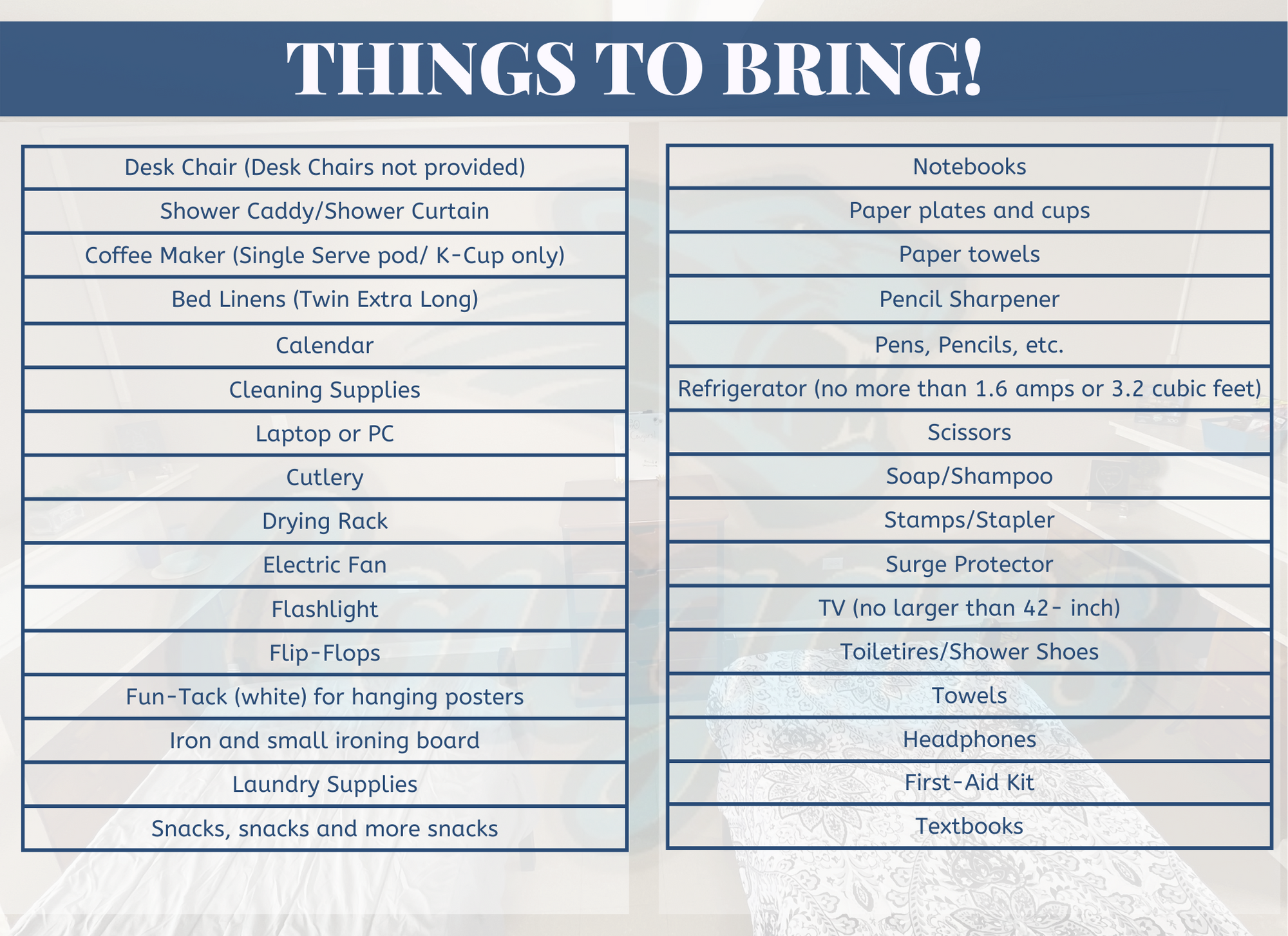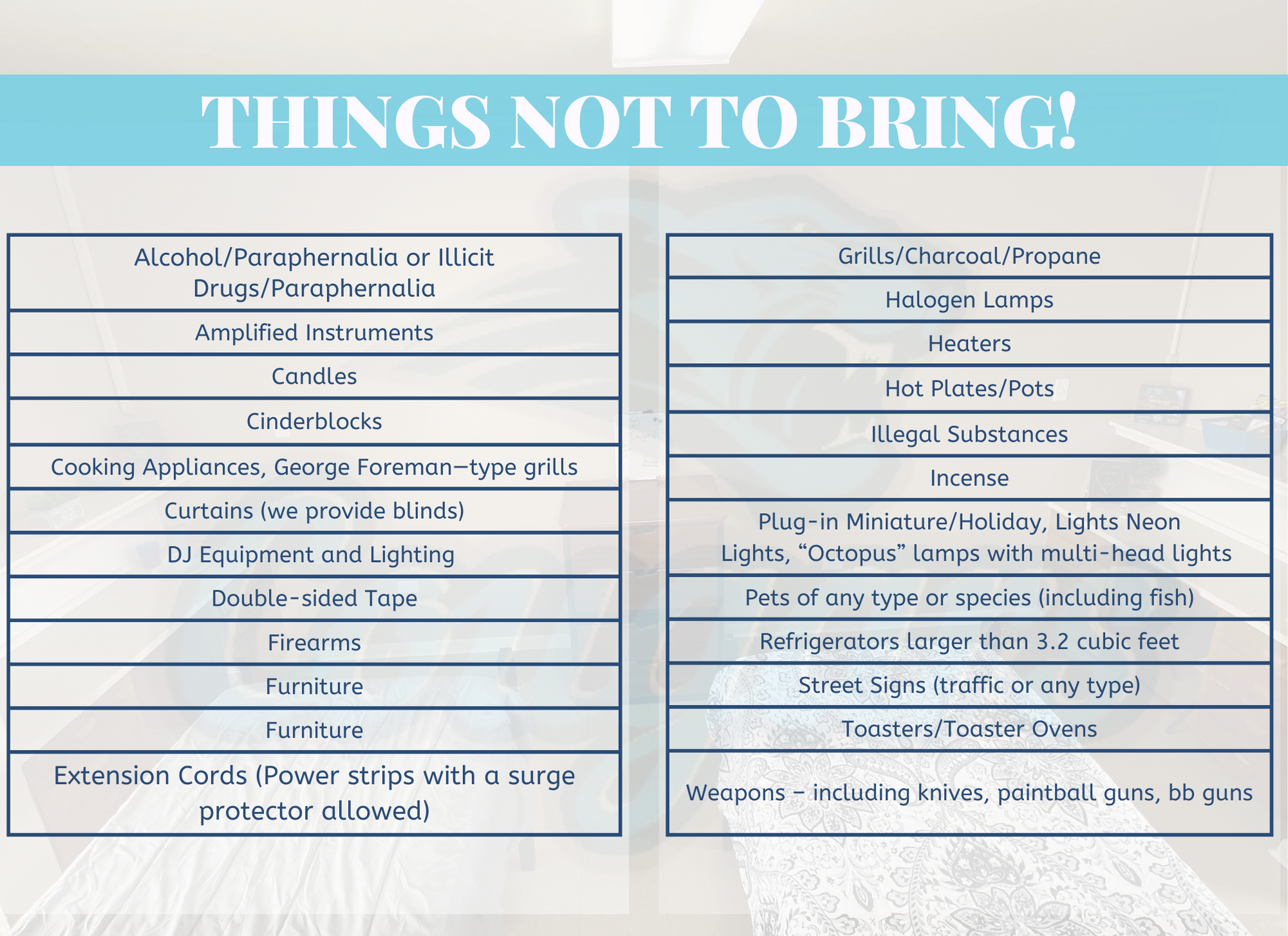Move-In Procedure
STUDENTS
Your on-campus experience will begin with move-in on:
|
TBA |
9AM to 12PM |
| Mandatory Student Orientation | 12:30PM to 1:30PM |
ALL Students are required to attend Student Orientation, please use the following link if the Fall 2024 semester will be your first at CBC:
The Director of Residence Life and the Resident Assistant Staff will greet you at Benton Hall, the first building on your right-hand side when utilizing the main entrance of the campus. At Benton Hall, you will receive your housing key and you will be signing your housing contract and room condition report.STEP 2: Receive your key. Each resident will be issued a key for their assigned dorm or apartment and is responsible for their room key. A $75.00 key replacement fee will be charged to student's account for any lost or stolen keys. You will also need to complete your Housing Contract and Key Agreement at the time of check-in.
STEP 4: Meet the RAs. The RAs will be available during move-in to assist with any questions you may have during check-in. An RA will be available in the lobby lounge of Benton Hall to answer any questions you may have.
Check out the Things to Bring and Not to Bring List:


Important information to remember while living on campus:
You and your roommate(s) are responsible for any damages to your room that are not the result of normal usage. At the time of check in, you should be certain your Room Condition Report form is accurate and complete. Room damages will be assessed from this form and monthly room inspections.
After the residence halls are completely closed, each room will be inspected, in detail, by the residential life professional staff for damages. Clean-up and damage charges will be assessed and charged (if applicable). Excessive damages may also be addressed through the judicial system.
Common Area Damage
The common area damage policy is one that stresses student responsibility. The living areas in the residence halls are part of your community, and you are expected to take responsibility for those areas. Public areas such as hallways, lounges, suites, etc., are not assigned to individuals. Damages in these areas can be very costly to everyone. Those directly responsible should bear the burden of paying and accepting judicial responsibility for the damage rather than having all students pay for such damages. The residents of an affected area are charged for damages only when the responsible person is not identified and billed for damages. This is done as a last resort, because we expect individuals to accept responsibility for damages they cause. We also expect persons living in affected areas to assist in identifying these people. In addition, our staff makes every effort to find the responsible person(s).
The benefits of this policy are: persons actually responsible for the damage pay for it; student responsibility and self-discipline are increased; and there is community responsibility for common living areas. The residence life staff is there to enable your community to function effectively, but a cooperative effort from everyone is needed to ensure maintenance of community areas.
Damage Billing Philosophy and Appeals
In an effort to maintain our residence hall facilities, we expect that students will take responsibility for any damages that they cause within their room, suite, apartment, and/or residence hall. As such, each student signs a Room Condition Report (RCR) upon moving into their room. The RCR outlines the condition of the room and furniture with respect to any damage that may be in the room prior to your arrival. At the end of the school year or when you move out (whichever occurs first), we will review the RCR and update it with the current condition of the room upon your departure. A final inspection will then occur, after all residents have moved out, involving the Director of Residence Life (or designee) and members of the Facilities Management staff. The appropriate charges to make the necessary repairs are then billed to the students who lived in the room. If one student does not take responsibility, it is divided among the roommates, suite mates, and/or apartment mates, depending on the location of the damage.
Students will be notified in writing of any damages for which they have been billed. At that time, any student can appeal a specific room, suite or apartment damage cost that has been billed to their student account. Common area damage can not be appealed. Students must submit their appeal to the Residential Life Office. We cannot accept any appeals from parents or family members. If at anytime someone accepts responsibility, in writing, for damages that have been billed to other students, those charges will be transferred to the appropriate person(s). The damage billing letter will include the process and deadline for submitting a damage appeal. Please note that the damage billing letter is not a bill. The Business Office will send out a formal bill indicating the amount due to the College. Please do not send any payments to the Residential Life Office.
Contact us at:
reslife@coastalbend.edu
